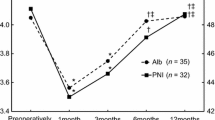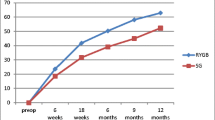Summary
Body composition and energy expenditure were investigated before and 10–14 days after surgery in 44 patients with upper gastrointestinal cancer (23 esophageal and 21 gastric cancer) in order to assess the impact of preoperative weight loss on metabolic adaptation to the surgical trauma and on postoperative complications. Patients were divided in three groups with I: 0–5%, II: 5–10% and III: > 10% preoperative weight loss related to the usual body weight. 50% of the patients presented with no or just minor weight loss. Even in case of weight loss > 10% no decrease below the ideal body weight was observed. Body cell mass and fat mass were significantly (p < 0.05) reduced in group III when compared with I. Since energy expenditure and substrate oxidation rates were rather normal in most patients weight loss was considered to be due to tumor related stenosis and dysphagia. More than 50% of the energy requirements were gained from fat oxidation. General criteria of malnutrition were not fulfilled. Perioperative weight loss was lowest (1.6 ± 4.9 kg) in patients of group III related to group I (2.9 ± 1.7 kg) and II (5.0 ± 6.9 kg). Similar elevation of energy expenditure and lipid oxidation with concomitant reduction in glucose oxidation was observed in all groups of patients. This led to a similar decrease of body cell mass. Independant of preoperative weight loss major complications occurred in 8 cases — pneumonia in 6 and leakage of the anastomosis in 2 patients; no patient died. From this study can be concluded that with regard to perioperative weight loss the metabolic response to surgical trauma is adequate even in patients with marked preoperative weight loss. These patients remain compensated and preoperative weight loss is without major effect on postoperative complication rate.
Zusammenfassung
Zur Frage des Einflusses des präoperativen Gewichtsverlusts auf die metabolische Adaptation an das Operationstrauma und auf die Häufigkeit postoperativer Komplikationen wurden 44 Patienten mit Karzinomen des oberen Gastrointestinaltrakts (23 Ösophagus-und 21 Magenkarzinome) 10–14 Tage prä- und postoperativ im Ernährungsstatus, der Körperzusammensetzung und der Stoffwechsellage untersucht. Die Patienten wurden entsprechend dem präoperativen Gewichtsverlust in den letzten 6 Monaten vor der stationären Aufnahme in 3 Gruppen unterteilt: I: Abnahme um 0–5% des Ausgangsgewichts, II: 5–10% und III: > 10%. 50% der Patienten wiesen präoperativ keinen oder nur einen geringen Gewichtsverlust auf. Auch bei hohem Gewichtsverlust wurde das jeweils errechnete ideale Körpergewicht nicht unterschritten. Körperzellund Fettmasse waren in Gruppe III signifikant (p < 0,05) niedriger als in Gruppe I. Da der Ruheenergieverbrauch bei den meisten Patienten nicht erhöht war, müssen als Ursache des Gewichtsverlusts Tumorstenose und Dysphagie, jedoch nicht ein Hypermetabolismus, angesehen werden. Mehr als 50% des Energiebedarfs wurden durch Lipidoxidation gedeckt. Insgesamt erfüllten selbst die Patienten in Gruppe III nicht die Kriterien einer Mangelernährung. Der perioperative Gewichtsverlust war in der Gruppe III am niedrigsten (1,6 ± 4,9 kg) im Vergleich zu den Gruppen I und II mit 2,9 ± 1,7 bzw. 5,0 ± 6,9 kg. In allen Gruppen wurde eine Erhöhung des Energieverbrauchs und der Fettoxidationsrate, einhergehend mit einer Hemmung der Glukoseoxidation, beobachtet. Dies resultierte in einer Verminderung der Körperzellmasse. Unabhängig vom präoperativen Gewichtsverlust kam es bei 8 Patienten zu schwerwiegenden Komplikationen mit Pneumonie in 6 und Anastomoseninsuffizienz in 2 Fällen. Kein Patient verstarb. Die metabolische Reaktion auf das Operationstrauma ist auch bei Patienten mit ausgeprägtem präoperativem Gewichtsverlust adäquat. Diese Patienten bleiben kompensiert und der präoperative Gewichtsverlust ist ohne signifikanten Einfluß auf die postoperative Komplikationsrate.
Similar content being viewed by others
Literatur
Abu Khaled M, Me Cutcheon MJ, Reddy S, Pearman PL, Hunter GR, Weinsier RL (1988) Electrical impedance in assessing human body composition: The BIA method. Am J Clin Nutr 47:789–792
Bossola M, Sitges-Serra A, Bellantone R, Doglietto GB, Gil MJ, Segura M, Pacelli F, Crucitti F (1990) Nutritional and non-nutritional factors associated with postoperative septic complications in gastric cancer (Abstract). Clin Nutr [Suppl] 9:48
Bozzetti F, Ammatuna M, Migliavacca S, Bonalumi MG, Faccetti G, Pupa A, Terno G (1987) Total parenteral nutrition prevents further nutritional deterioration in patients with cancer cachexia. Ann Surg 205:138–143
Brandmair W, Lehr L, Siewert JR (1989) Ernährungsstatus beim Ösophaguskarzinom: Erfassung und Bedeutung für eine präoperative Risikoabschätzung. Langenbecks Arch Chir 374:25–31
Brandmair W, Lehr L (1989) Der postoperative Energiebedarf nach großen abdominalchirurgischen Eingriffen: Vergleich der Messung durch indirekte Calorimetric mit rechnerischer Schätzung. Langenbecks Arch Chir 374:138–145
Brenner U, Müller JM, Keller H, Schmitz M, Horsch S (1983) Ein neuer Ernährungsindex zur präoperativen Beurteilung der Mangelernährung als Risikofaktor in der Chirurgie. Infusionstherapie 10:302–305
Buzby GP, Williford WO, Peterson OL, Crosby LO, Page CP, Reinhardt GF, Mullen JL (1988) A randomized clinical trial of total parenteral nutrition in malnourished surgical patients: The rationale and impact of previous clinical trials and pilot study on protocol design. Am J Clin Nutr 47:357–365
Ebener C, Becker H, Heicapell R, Ohmann C, Röher HD (1989) Der Verlauf präoperativer parenteraler Alimentation auf den perioperativen Verlauf bei Patienten mit Ösophaguskarzinom. Langenbecks Arch Chir 347:208–213
Hansell DT, Davies JWL, Burns HJG (1986) The relationship between resting energy expenditure and weight loss in benign and malignant disease. Ann Surg 203:240–245
Harris JA, Benedict FG (1919) A biometric study on basal metabolism in man. Publication No 279, Carnegie Institution of Washington. (Zit. nach [12a])
Haugstvedt TK, Viste A, Eide EG, Real C, Soreide O et al. (1991) Factors related to and consequences of weight loss in patients with stomach cancer. Cancer 67:722–729
Heber D, Byerly LO, Chlebowski RT (1985) Metabolic abnormalities in the cancer patient. Cancer [Suppl] 55:225–229
Heberer M, Günther B (1988) Praxis der parenteralen und enteralen Ernährung in der Chirurgie. Springer, Berlin Heidelberg New York
Kern KA, Norton JA (1988) Cancer cachexia. JPEN J Parenter Enteral Nutr 12:286–298
Knox LS, Crosby LO, Feurer ID, Buzby GP, Miller CL, Mullen JL (1983) Energy expenditure in malnourished cancer patients. Ann Surg 197:152–161
Lindmark L, Bennegard K, Eden E, Ekman L, Schersten T, Svaninger G, Lundholm K (1984) Resting energy expenditure in malnourished patients with and without cancer. Gastroenterology 87:402–408
Meyenfeldt MF von, Meijerink WJHJ, Soeters PB, Veen H, Buil-Maessen R, Rouflart MMJ (1990) Perioperative nutritional support results in a reduction of major postoperative complications especially in high risk patients (Abstract) Clin Nutr [Suppl] 9:55–56
17.Miholic J, Meyer HJ, Müller MJ, Weimann A, Pichlmayr R (1990) Nutritional consequences of total gastrectomy: the relationship between mode of reconstruction, postprandial symptoms and body composition. Surgery 108:488–494
Müller JM, Brenner U, Dienst C, Pichlmaier H (1982) Preoperative parenteral feeding in patients with gastrointestinal carcinoma. Lancet I:68–71
Müller MJ, Fenk A, Lantz HU, Selberg O, Canzler H, Balks HJ, Mühlen A von zur, Schmidt E, Schmidt FW (1991) Energy expenditure and substrate metabolism in ethanol-induced liver cirrhosis. Am J Physiol 260 (Endocrinol Metab 23):E338-E344
Müller MJ, Selberg O, Lantz HU, Weimann A, Meyer HJ, Canzler H (1991) Tumorkachexie: Pathophysiologische Grundlagen und ernährungsmedizinische Aufgabe. Aktuel Ernähr Med 16:1–6
Mullen JL, Buzby GP, Matthews DC, Smale BF, Rosato EF (1980) Reduction of operative morbidity and mortality by combined preoperative and postoperative nutritional support. Ann Surg 192:604–613
Richardson RA, Fearon KCH, Hannan J, Cowan S, Watson W, Shenkin A, Garden OJ (1990) Estimation of body cell mass (BCM) in surgical patients by bioelectrical impedance analysis (BIA) compared with total potassium (TBK) measurement (Abstract). Clin Nutr [Suppl] 9:74
Schlag P, Fritz T, Hölting T (1988) Prognostic significance of nutritional status in cancer surgery. Recent Results Cancer Res 108:154–159
Selberg O, McMillan DC, Preston T, Carse H, Shenkin A, Burns HJG (1990) Palmitate turnover and its response to glucose infusion in weight-losing cancer patients. Clin Nutr 9:150–156
Selberg O, Weimann A, Meyer HJ, Canzler H, Müller MJ (1991) Lipolyse und Lipidoxidation bei gewichtsstabilen Patienten mit malignen Tumoren des Verdauungstraktes. Infusionstherapie 18:80–84
Shaw JHF, Humberstone DA, Douglas RG, Koea J (1991) Leucine kinetics in patients with benign disease, non-weight-losing cancer, and cancer cachexia: Studies at the whole-body and tissue level and the response to nutritional support. Surgery 109:37–50
Shizgal HM (1990) Validation of the measurement of body composition from whole body bioelectric impedance. Infusionstherapie [Suppl 3] 17:67–74
Stovroff MC, Fraker DL, Travis WD, Norton JA (1989) Altered macrophage activity and tumor necrosis factor: Tumor necrosis and host cachexia. J Surg Res 46:462–469
Studley HO (1936) Percentage of weight loss — a basic indicator of surgical risk in patients with chronic peptic ulcer. JAMA 106:458–460
The Veterans Affairs Total Parenteral Nutrition Cooperative Study Group (1991) Perioperative total parenteral nutrition in surgical patients. N Engl J Med 325:525–532
Weiner R, Hartig W, Kretschmar F (1990) Optimierung von Parameter-Kombinationen zur Erfassung einer Mangelernährung bei Krebskranken (Abstract). Infusionstherapie [Suppl 1] 17:60
Windsor JA, Hill GL (1988) Weight loss with physiologic impairment. Ann Surg 207:290–296
Yamanaka H, Nishi M, Kanemaki T, Hosoda N, Hioki K, Yamamoto M (1989) Preoperative nutritional assessment to predict postoperative complication in gastric cancer patients. JPEN J Parenter Enteral Nutr 13:286–291
Author information
Authors and Affiliations
Additional information
Mit Unterstützung der Firma B. Braun, Melsungen
Rights and permissions
About this article
Cite this article
Weimann, A., Meyer, H.J., Müller, M.J. et al. Bedeutung des präoperativen Gewichtsverlusts für die perioperative Stoffwechseladaptation und das Operationsrisiko bei Patienten mit Tumoren im oberen Gastrointestinaltrakt. Langenbecks Arch Chir 377, 45–52 (1992). https://doi.org/10.1007/BF00186148
Received:
Published:
Issue Date:
DOI: https://doi.org/10.1007/BF00186148




